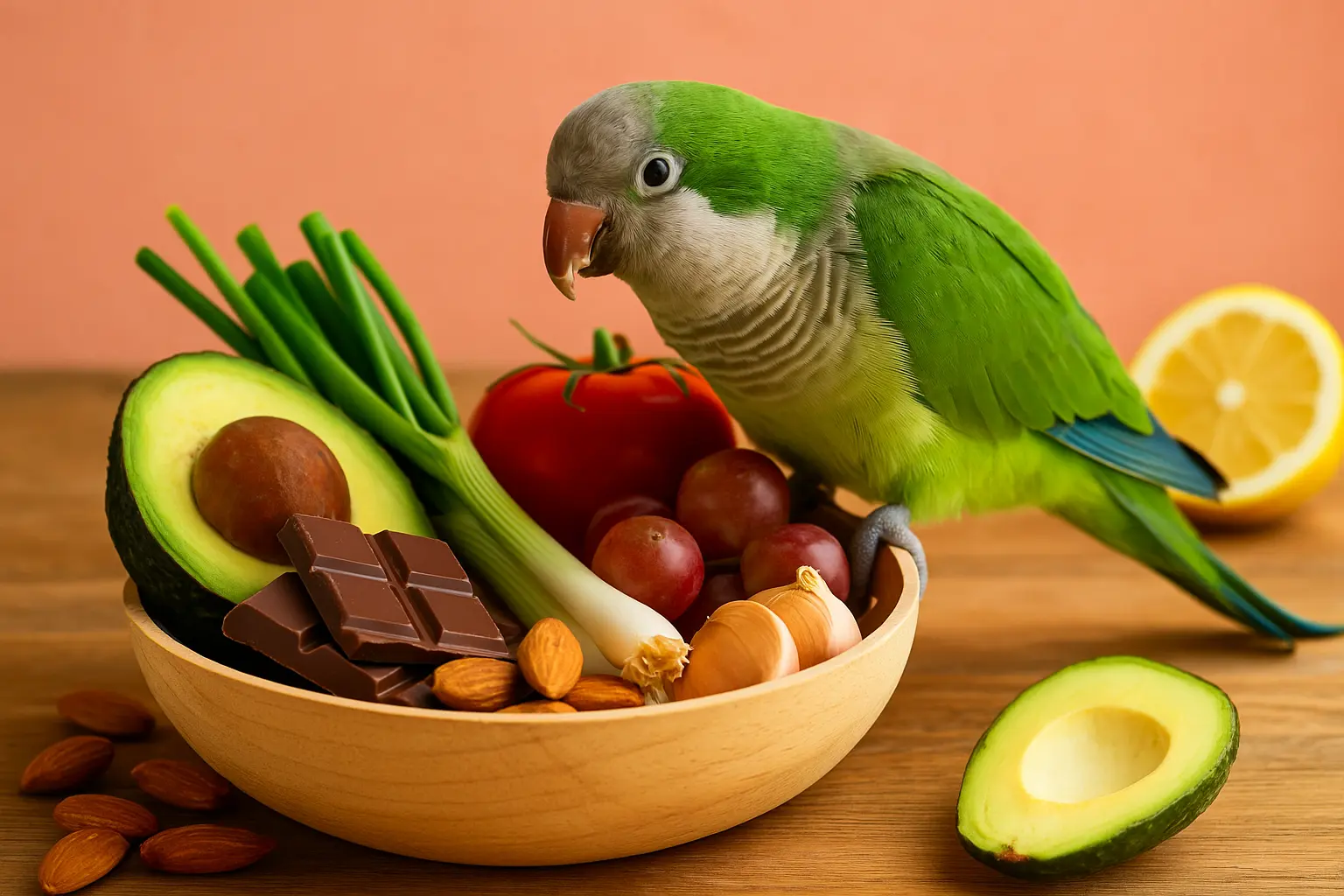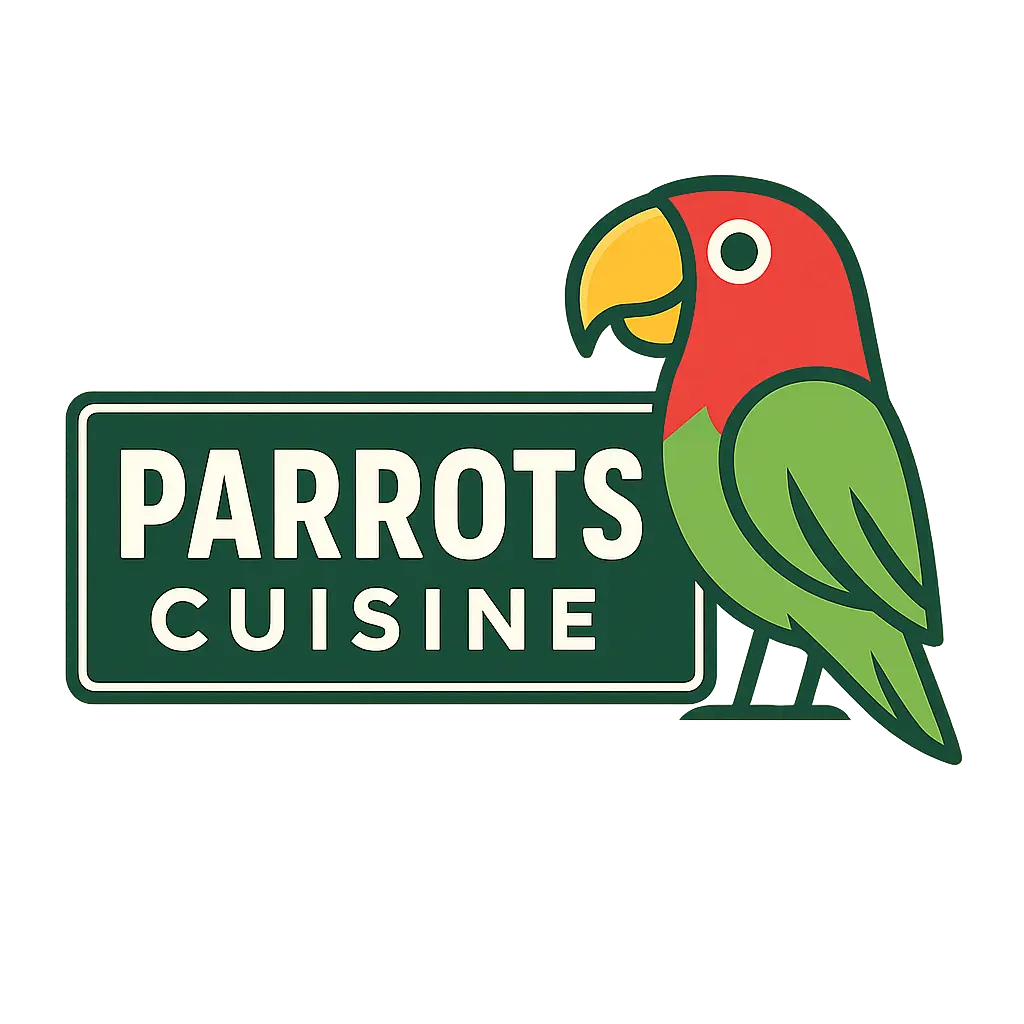Toxic foods for parrots you should avoid and emergency tips

Some fruits, vegetables, and snacks that seem safe for humans are actually toxic foods for parrots. Even a small bite of things like avocado, raw eggplant, or certain seeds can make your parrot very sick, or even be life-threatening. That’s why every parrot owner needs to know which foods to avoid.
Why are these common foods risky for your parrot? Most people are surprised to find out that the danger isn’t just in chocolates or junk food, but in everyday items found in almost every kitchen. Is your parrot safe from these hidden dangers? Let’s find out what really makes some foods toxic for parrots.
Toxic Foods for Parrots
Most people have no idea how many foods or meals can actually be toxic foods for parrots. Even I made many mistakes as a beginner, giving my birds the wrong foods, and sadly, I lost some beloved parrots because of this. Tamed parrots spend so much time with their owners, often eating and sharing food together. Owners usually offer whatever their parrot loves to eat, without thinking that it could actually be harmful—even if it’s something the parrot enjoys. This doesn’t mean you should never give those foods, but you need to know the right quantity and timing.
For example, my Sun Conure rocky loved eating flatbread with tea—a common breakfast in many Asian homes. He enjoyed oily foods so much that it became a habit. But feeding these foods every day is risky, and it took me time and effort to help him break this habit. There are many foods you should completely avoid, and some that can be given only rarely in very small amounts. Here’s a practical safety guide for every parrot owner.
Fruits, Seeds & Dry Fruits
Fruits You Should Never Give (Highly Toxic)
- Avocado: Contains persin, a toxin that can cause heart and breathing failure in parrots. This is deadly for birds.
- Cherries (including pits): Fruit flesh has small amounts of cyanide compounds, and the pits are even more toxic. Best is to avoid completely.
- Raw Rhubarb: High in oxalic acid, which can lead to poisoning and kidney stones in parrots.
Fruit Seeds That Are Dangerous
- Apple, pear, apricot, peach, cherry, plum (jamun) seeds all contain amygdalin, which turns into deadly cyanide in the bird’s stomach. Even a few seeds can harm, especially for small parrots.
- Always peel fruits well and remove all seeds and pits before giving to parrots. Even a little seed residue can be risky.
Dry Fruits (Dried Fruits and Nuts)
- Most dried fruits are treated with sulphites or preservatives that are harmful for parrots.
- High sugar content can cause obesity, diabetes, liver problems, and yeast infections.
- Chewing is not needed, so it does not promote natural foraging behavior.
- Best is to avoid dried fruits completely. If you want to give, choose only a tiny amount of unsulphured, preservative-free dry fruit, and soak it in water to reduce sugar. Give only as a rare treat, not as a regular part of the diet.
Vegetables That Are Risky for Parrots
Nightshade Family Vegetables
- Potatoes: Never give green parts, sprouts, eyes, or raw potato. Only plain, boiled or baked white potato flesh (no salt, no skin) is safe, and that too rarely.
- Tomatoes: Never give leaves, stems, vines, or unripe (green) tomatoes. Ripe, red tomato flesh (without leaves or stems) is safe in strict moderation.
- Eggplant (Baingan): Best to avoid. Contains solanine, which can irritate digestion and may be toxic, especially if unripe or raw.
- Peppers: The fruit and seeds are safe (parrots love chillies), but never give the leaves, stems, or flowers.
Toxic Stems and Leaves
- Rhubarb leaves: Extremely high in oxalic acid, can be fatal even in small amounts. Stems are also risky. Never give rhubarb.
- Potato and tomato leaves/stems: These green parts are very toxic for parrots and should always be avoided.
Uncooked Pulses and Beans
- Never give raw or undercooked beans, lentils, or chickpeas. They contain natural toxins (lectins) that can cause severe stomach upset or even be fatal.
- Only thoroughly soaked and boiled beans/pulses are safe. Sprouted beans are also a good option, but always use fresh and mold-free sprouts.
If you ever see signs of bird poisoning after any food mistake (vomiting, trouble breathing, or unsteady grip), get help quickly.
Processed and Spicy Foods to Always Avoid
- Salty snacks and junk food: This includes chips, spicy mix snacks (like Indian “namkeen” or snack mix), salted crackers, and any packaged savory snacks. These are full of salt, unhealthy fats, spices, and preservatives that are dangerous for parrots.
- Sweet desserts and candies: Things like traditional sweets (ladoo, barfi, halwa), cakes, cookies, and candies are very high in sugar, and often have milk products or food coloring that parrots cannot digest.
- Fried foods: Avoid sharing fried snacks such as fritters (pakoras), samosas, doughnuts, or any deep-fried treats. The oil and batter are not safe for birds.
- Caffeinated and sugary drinks: Never offer tea, coffee, soft drinks, or energy drinks to parrots. These can cause serious heart and nerve problems.
- Chocolate or anything with cocoa: Even a small amount can cause poisoning in parrots and is considered deadly.
- Raw dough: Never give raw bread dough or pizza dough. It expands in the crop and can cause life-threatening problems.
Many people also share small pieces of plain flatbread (roti, tortilla, pita bread) or plain rice with their parrots. While a tiny piece of unsalted, unbuttered bread or plain boiled rice can be given once in a while, it should never be a regular food. These foods have almost no nutrition for birds and too much can make them sick. Always avoid anything that is salty, sweet, oily, fried, or has artificial flavors and colors.
Additives, Supplements, and Dairy Products
Human Vitamin Tablets
- Never give human vitamins to parrots. Birds can easily overdose, especially on vitamins A, D, E, and K. Use only avian vet-prescribed bird supplements.
Salt and Processed Foods
- Even a little extra salt is harmful for parrots. Never give chips, salted nuts, or canned foods.
Dairy (Milk, Cheese, Cream)
- Parrots cannot digest lactose in dairy. Milk, cream, and soft cheese cause stomach problems and diarrhea. For calcium, use leafy greens, almonds (very small amount), and cuttlebone.
What to Do If Your Parrot Eats a Toxic Food
If your parrot eats any harmful chemical or food, try not to panic. Look for any warning signs like vomiting, trouble breathing, weakness, or sitting still for too long. If you notice serious symptoms, do not experiment at home—take your parrot to a bird vet right away.
If it’s just a small amount of regular junk food, don’t worry too much. It does not harm your parrot if given only occasionally, but never make it a habit. This does not mean you should never give your parrot their favorite treats, but avoid offering them every day. To support their health, give multivitamins regularly, always provide clean and fresh feed, and never leave food out for too long. Try to follow a proper feeding schedule for your bird.
I hope this guide helps you avoid these common mistakes and keeps your parrot healthy for a long and happy life. Every little change in diet makes a big difference—always double-check before giving anything new to your bird.
If you have any questions, feedback, or need more help about parrot care, feel free to email me at writersdesk81@gmail.com. I always try to reply as soon as possible!
